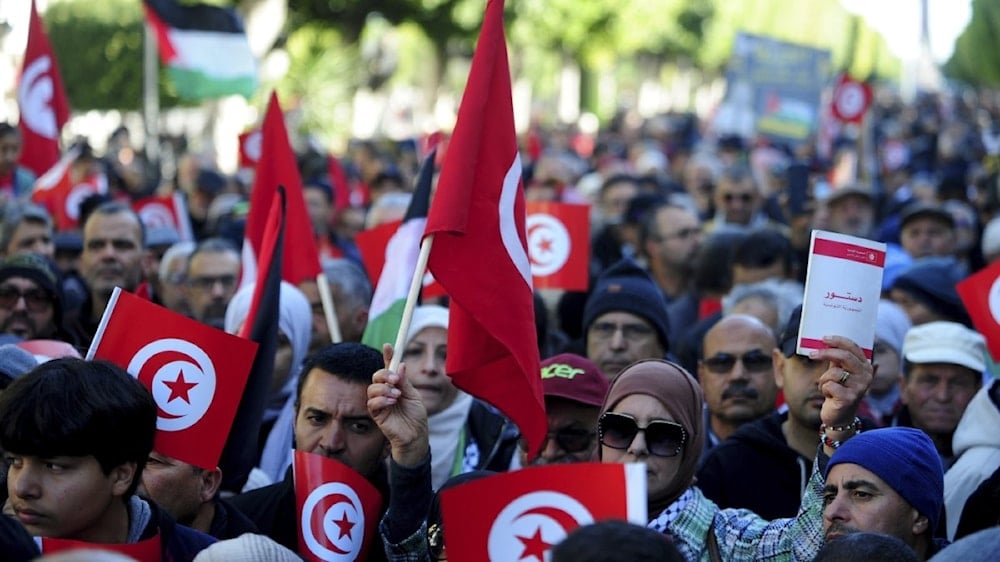Tunisia opposition figures get prison terms after mass trial
A Tunisian court sentences several prominent opposition figures to prison terms of up to 66 years for alleged national security offenses in a trial widely condemned by rights groups and lawyers as a "masquerade."
-

People commemorate the 13th anniversary of the Tunisian uprising in Avenue Habib Bourguiba, Tunisia, on January 14, 2024. (AP)
A Tunisian court has sentenced several individuals, including prominent opposition figures, to prison terms ranging from 13 to 66 years for alleged national security breaches, according to local media reports on Saturday.
Media reports revealed that the extensive trial, involving about 40 defendants, has sparked strong condemnation from rights organizations and defense lawyers, who have called it a "masquerade."
An official from the anti-terrorism prosecutor’s office stated that the accused were found guilty of "conspiracy against state security" and "belonging to a terrorist group," as reported by outlets like Jawhara FM.
It is unclear whether all defendants received prison sentences or just some. Among those convicted are political leaders, lawyers, and businesspeople, some of whom have been detained for two years, while others are in exile or remain free.
Defense lawyers condemned the trial on Friday night after the judge started deliberations without considering arguments from either the prosecution or defense. Lawyer Samia Abbou stated, “The authorities want a verdict today,” accusing the court of “flagrant violations of judicial procedure” and claiming the accused were “not heard,” calling it a “masquerade” in remarks to AFP.
Moreover, prominent opposition figures in the trial include Jawhar Ben Mbarek, Abdelhamid Jelassi, and Issam Chebbi, founder of the National Salvation Front coalition, as well as activists Khayam Turki, Chaima Issa, and businessman Kamel Eltaief.
Since the trial began on March 4, defense lawyers have repeatedly demanded the presence of all defendants in court, including six who are currently on hunger strike. They have labeled the case as “empty,” while Human Rights Watch has pointed out that it is taking place in a broader climate of repression, accusing President Kais Saied of “weaponising the judicial system to target opponents and dissidents.”
Earlier this month, hundreds of Tunisians held two protests on April 9 against what they described as the "authoritarian rule" of President Saied, demanding the release of political prisoners, while six detained opposition figures began a hunger strike.
Supporters of the opposition "Free Constitutional Party" gathered in Tunis, demanding the release of their detained leader Abir Moussi, chanting slogans against President Saied, according to Reuters, while hundreds of supporters of the opposition "National Salvation Front" also held a separate protest in Tunis, calling for the release of detained politicians, activists, and journalists.
Six prominent detained opposition figures, accused of "conspiracy," have begun a hunger strike in prison to protest their upcoming trial, their lawyers said Wednesday.
What you need to know
On February 5, 2025, a Tunisian court handed down prison sentences and fines to politicians and media figures in the high-profile "Instalingo" case, which involved a digital content company accused of wielding political and media influence, with most defendants affiliated with the Ennahda movement.
Among the most significant verdicts was the sentencing of Rached Ghannouchi, the 83-year-old leader of Tunisia's Islamist Ennahda party, to an additional 22 years in prison on charges of "plotting against state security," with his lawyers denouncing the ruling as "harsh" and announcing plans to appeal.
In August of 2024, a Tunisian court barred several potential presidential contenders from October's election, sentencing Abdel Latif Mekki, Nizar Chaari, Mourad Massoudi, and Adel Dou to eight months in prison for alleged vote-buying, while prominent opponent Abir Moussi received two years for "insulting the election commission"—moves critics call an effort to eliminate challengers to President Kais Saied, according to lawyer Mokhtar Jmai.
In July, another potential candidate, Lotfi Mraihi, was similarly sentenced to eight months in prison and banned from running on vote-buying charges.

 4 Min Read
4 Min Read










